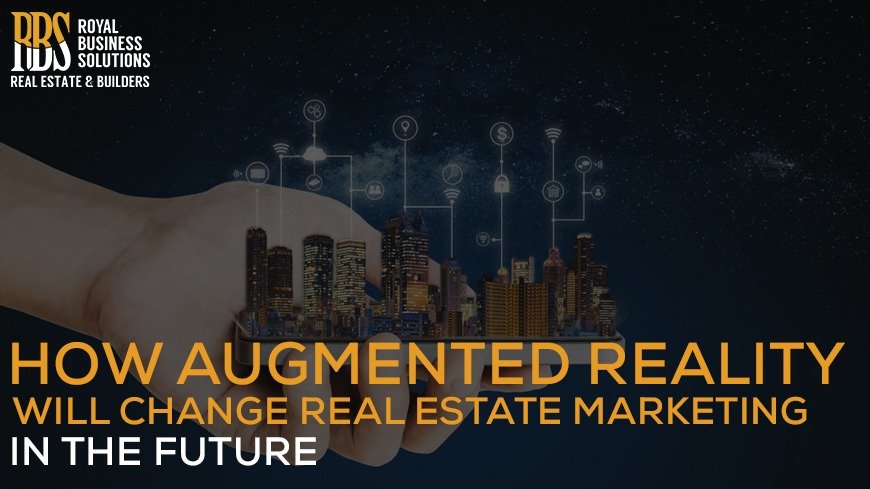- November 2, 2023
- Posted by: Muhammad Shehzad
- Category: Blogs

Introduction
Augmented Reality (AR) in real estate is changing how we buy and sell properties. It adds digital information like property details, 3D models, and virtual furniture to the real world. This helps buyers see properties in a more fun way and makes it easier to decide. It’s useful for real estate agents and buyers. With AR, people can look at properties from a distance, which saves time for everyone. This new tech is making the real estate business better and more interesting.
In this blog post, we’ll explore how Augmented Reality(AR) changing the real estate market, its benefits, and trends in 2023.
How AR Will Change Real Estate Marketing?
Augmented Reality (AR) is poised to revolutionize real estate marketing, offering innovative ways to showcase properties and engage potential buyers. As technology continues to advance, AR is becoming a game-changer in the industry, transforming the entire marketing landscape.
Here are some key ways in which AR is changing real estate marketing:
Virtual Property Tours
AR lets potential buyers take virtual property tours at home. With apps or AR glasses, they can add digital stuff to their real surroundings, making it feel like they’re really there. They can explore properties in 3D, see room layouts, and finishes, and even picture their own furniture in the space.
These tours give a better idea of the property, so you don’t have to visit it in person, saving time for both buyers and sellers.
Virtual Staging and Renovations
AR can add digital furniture and decorations to properties, making them look better. Additionally, buyers can see how the space might look with different furniture, paint colors, or renovations.
This not only helps attract buyers but also lets real estate agents offer services like interior design or home improvement.
Engaging Property Listings
Regular property listings usually have pictures and descriptions. AR makes listings more interesting. Buyers can scan a property’s picture to see extra stuff like 3D floor plans, videos, or mortgage calculators. Also, this makes it more fun and helps buyers make better choices.
Read: How To Invest In Real Estate: 5 Steps To Getting Started?
Location-Specific Property Info
AR apps can show real-time info about properties in the area. When buyers walk around, they can use their phones or AR glasses to see details about nearby properties for sale or rent. This is great for agents who want to help clients while showing them around.
Easier Decision-Making
AR makes it simpler for buyers to decide. They can compare properties and use financial tools to check costs and potential profit. In addition, this makes buying a house quicker and smarter.
Enhanced Marketing Materials
AR can be integrated into marketing collateral such as brochures, business cards, or promotional materials. By scanning these materials with a mobile device, potential clients can access additional property information and virtual tours. This augmented content also adds an innovative touch to their branding.
Benefits of Augmented Reality(AR)
Augmented Reality (AR) provides many benefits for different industries and uses. Also, here are some key advantages of AR technology:
Enhanced User Experience
AR creates immersive and interactive experiences by overlaying digital information in the real world. Moreover, this enhances user engagement and offers a more enjoyable and memorable experience for consumers and users.
Customer Satisfaction
When real estate folks use augmented reality, they make customers happier. It gives buyers a cool and informative experience, which makes them feel good. It can also help them decide faster, so properties get sold quicker.
Saving Money
Using augmented reality in real estate might need some money at first, but it can save money in the long run. Virtual property tours and cool displays mean fewer in-person visits, which saves time and money.
Also, working together from far away can cut down on travel costs and other expenses.
Remote Collaboration
AR facilitates remote collaboration by allowing users to share their augmented view with others. Although in fields like maintenance, repair, and telemedicine, this feature enables experts to provide guidance and support from a distance.
Marketing and Advertising
AR offers innovative marketing opportunities, allowing businesses to create interactive and engaging campaigns. Finally, AR apps and experiences can help showcase products, provide interactive ads, and offer personalized marketing content.
Retail and E-commerce
AR improves the shopping experience by allowing customers to virtually try on clothes, visualize furniture in their homes, or see how products will look in real-world settings. However, this reduces the likelihood of returns and enhances the customer’s confidence in their purchase.
Accessibility
AR can be used to assist individuals with disabilities. For example, it can provide real-time sign language translation, audio descriptions of surroundings, and navigation guidance for those with visual impairments.
Also Read: Writing Creative Real Estate Listing Descriptions: 5 Pro Tips
Conclusion
Augmented reality is changing real estate marketing. It brings lots of good things like virtual property tours, interactive displays, and location-based info. This makes buying and selling houses easier and cheaper. As tech gets better, augmented reality will become even more important in real estate.
Also, it’s a cool time for buyers and sellers. Furthermore, real estate pros who use this tech will likely do better and give clients a great experience in the changing market.
